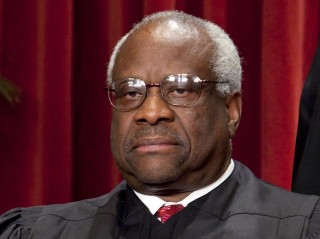 Abortion law is an innately complex topic, because the nature of pregnancy is unique in its evolving relationship between an individual woman and another potential human being. These laws have myriad ripple effects, impacting everything from employment law to domestic violence to medical ethics. And of course, abortion raises the irresistible trifecta of politics, religion and sex.
Abortion law is an innately complex topic, because the nature of pregnancy is unique in its evolving relationship between an individual woman and another potential human being. These laws have myriad ripple effects, impacting everything from employment law to domestic violence to medical ethics. And of course, abortion raises the irresistible trifecta of politics, religion and sex.
Such complexity being the case, it’s really not tough to come up with credible arguments on both sides of any abortion-related debate. But even given the plethora of valid legal points ripe to be raised, Justice Thomas picked some really, really lame ones to use in his dissent.
My favorite three:
“Today the Court strikes down two state statutory provisions in all of their applications, at the behest of abortion clinics and doctors.”
Really? The Supreme Court is operating “at the behest” of abortion clinics and doctors? That’s kind of obnoxious. The millions of liberty-loving Americans who fight for abortion rights do so as advocates for women, not for clinics. The suggestion that our highest Court doesn’t actually care about reproductive rights or Constitutional precedent, but rather, is the puppet of abortion clinics is absurd and offensive. The vote on Whole Woman’s Health v. Hellerstedt came down to a single justice. Had the vote gone the other way, would Thomas have acquiesced that SCOTUS was operating “at the behest of pro-lifers and religious zealots”? I seriously doubt it.
“To begin, the very existence of this suit is a jurisprudential oddity. Ordinarily, plaintiffs cannot file suits to vindicate the constitutional rights of others. But the Court employs a different approach to rights that it favors.”
You have to respect how Justice Thomas is unapologetic in his hypocrisy. The justice is certainly right that lawsuits require that the plaintiff have proper standing to sue. But questions about abortion have always required a “different approach” because pregnancy is inherently different from other subjects. More importantly, the entirety of pro-life rhetoric is founded on the idea of third-party assertion of rights. Every time state governments reach their legislative hands into women’s uteruses, they justify the intrusion with their obligation to protect the unborn; no clearer assertion of the rights of “others” has ever been made. Thomas knows that, and his pretense here is gross.
Moreover, there’s nothing in the majority’s opinion to indicate any “special treatment” of Texan women’s First Amendment rights. Like it or not, under Roe v. Wade, the right to have an abortion exists, plain and simple. Under other case law (not to mention common sense), laws that “regulate” abortions (or any other rights for that matter) so tightly as to prevent a person from exercising their rights are overly intrusive.
The Court’s decision that Texas placed an “undue burden” on women by passing laws that would close most abortion clinics has little to do with abortion and everything to do with logic. Allowing women to get abortions only in some absurdly narrow set of equals outlawing abortion. If Texas had legislated in a manner that would close half its gun stores, the Court would likely have found a similar undue burden on the Second Amendment. The analysis really isn’t specific to abortion; it’s about pragmatism. A regulation that would have the practical effect of denying a right to a large percentage of those poised to exercise that right likely places an “undue burden” on that right.
“The majority applies the undue-burden standard in a way that will surely mystify lower courts for years to come.”
Maybe I’m some sort of legal genius, but I’m nowhere near “mystified” right now. I’m not even a little bit confused. The Texas law made it super tough for Texan women to get abortions, mainly in that it closed most Texan abortion clinics. Forcing someone seeking a medical procedure to jump through costly and difficult hoops is pretty clearly an “undue burden” – whether we’re using the plain meaning or the legal meaning of those words. I’m not quite sure what Justice Thomas finds confusing about that.
Sandwiched deliciously between the majority’s well-reasoned opinion and Thomas’ flawed dissent was RBG’s single-paragraph concurrence, called out Texas for its nonsense:
“Texas argues that H. B. 2’s restrictions are constitutional because they protect the health of women who experience complications from abortions. In truth,’complications from an abortion are both rare and rarely dangerous.’”
Or in other words, “Texas: just stop.”
Glad to know that Ruth is always there to pick up the slack when Clarence lets us down.